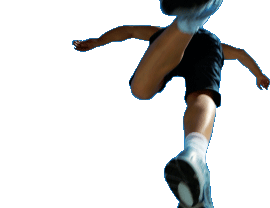WE BUILD UNDERSTANDING BETWEEN CULTURES

L-R: Director, Markerting and Communications British Council Rabi Isma, and Assistant Communications
Manager Gbenga Emuwawon at the courtesy visit to Timbuktu Media. Photo: FEMI ADEBESIN-KUTI
How is the British Council different from the British High Commission?
The British Council is the United Kingdom’s international organisation for education and cultural relations. We focus on projects that enable social and educational development, particularly in three areas: Art; English; Education and Society. We are a nonpolitical organisation and while some of our funding comes from a grant from the United Kingdom, we also source for funding, such as from the contract work that we do, our exams and teaching (teaching not in Nigeria but we have teaching centres in some countries across the world).
We are not the British High Commission and I know that a number of people confuse us. Our work involves people and sometimes to get to people, we also use institutions like what we are doing under our English area of work.
For example, we are training teachers in the country and to do that, we are working with institutions, through the government organisations in various states. For instance, working through them to sponsor the training of teachers in their states. We are working with the Universal Basic Education Commission and the states’ Universal Basic Education Board to train even more teachers across the country. We are working with universities in Nigeria to link them with the universities in the UK. We are working with secondary schools, linking them with secondary schools in the UK, and that is about building skills and exchange of ideas so that both parties can learn from each other - which is a major part of our work: building understanding between different cultures, between people in the UK and people in Nigeria.
In the area of Art, we are doing the same thing: connecting creative people with skill to schools, to mentors, to develop their skills as they move from one life stage to the other. Under our educational society work, we are doing various programmes involving youth groups, involving NGOs, a big portion of our work involves the exam services that we deliver.
Last year, we delivered over 60,000 exams to over 20,000 candidates. We are also running some state contracts on behalf of organisations such as the Department for International Development where we are working in areas of security in justice.
There is a project we are doing called Africa Knowledge Transfer Partnership (AKTP); what we doing in that project is connecting academia to business so we are drawing from science departments in universities connecting them to industries in Nigeria such that what goes on at universities can ease into business.
What you find is that you have universities doing their researches on their own, businessmen running their businesses can benefit from real life experience but there is nothing linking them together.
The African Knowledge Transfer Partnership (AKTP) project bring them together so we have for instance we have the Bayero University in link to the tannery in Kano. So the tannery is the business but it is benefiting from the research done by the chemistry department in the school and they the university have somebody in the tannery learning to see how that resource is actually transformed into improved finished product. So that one way we are linking them together. And that is building research from science.
Apart from your work in the arts what are you doing in the area of science?
More of what we do mainly is connecting for development. So even our work we creative people, we realise it is not enough for them to have talent alone, they need business skills and entrepreneurial skills that will help them not only to develop their creativity but to build the business around them.
—————
